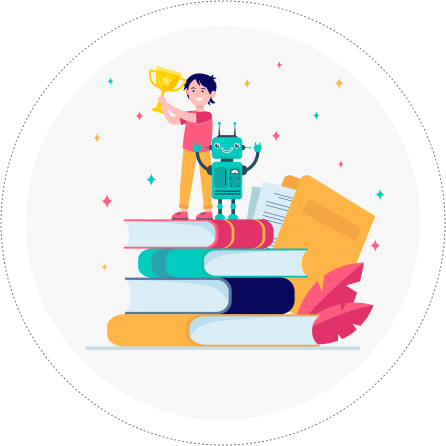Computer Science 11
- Home
- / Python Handay
- / Computer Science 11
Welcome!
Computer Science for CBSE Class 11th students is a 100-Mark subject encompassing Python Programming , Computer Systems & Organization , and Society, Law, & Ethics. The examination structure comprises a 70-Mark theory paper and a 30-Mark practical paper administered at school.
Prerequisites
Before delving into Computer Science-11th, it’s essential to have a basic understanding of operating system.
Learning Objectives
Students will acquire fundamental expertise in programming languages, and computer systems, laying a solid foundation for advanced studies in the IT sector or pursuing degrees such as B.Tech, BCA, B.Sc(IT) thereby significantly enhancing career prospects in the field.
Course Overview
Module 1: Computer System & Organization 10 Marks
- What is Computer and Application of Computer
- Working Process of Computer
- Introduction about Hardware & Software
- Functioning Component of Computer
- Memory Unit
- Understanding Types of Software
- Understanding OS & its Role
- Boolean Logic(Logic Gate,Truth Table)
- Number System and it’s conversion
- Encoding Schemes
Module: 2 Python 45 Marks
- Steps for Problem Solving
- Flow Chart & Algorithm
- Pseudocode & Decision Tree
- Decomposition
- What is Error and Types of Error
- Types of Programming Language
- What is Python ? Advantage & Disadvantage of Python
- Application & Scope of Python
- Understanding Python IDLE and it’s Mode
- Writing First Program & Executing in Python IDLE
- Understanding I/O in Python
- Tokens
- Keyword & Identifiers
- Naming Rules of Identifiers
- Understanding Variable , Multi Assignments and Dynamic Typing
- Concept of l-value and r-value
- Literals & Punnctuator
- Escape Sequence Character
- Expressions, Statement & Comments
- Extensive Live Programming Practice (Minimum 9 Programs)
- What is Data Type and its type
- Type Casting
- Understanding Mutable & Immutable Types
- What is Operators & its different types
- Expressions & Statements
- Precedence of Operators
- Evaluation of an expression
- Extensive Live Programming Practice (Minimum 12 Programs)
- Types of statement in python
- Sequence Flow Control
- Blocks & Indentation
- Conditional Statements and its type(if, if…else, elif)
- Understanding The range() function
- Iteration/ Looping Statements and its type(for,while)
- Loop else Statement
- Nested Loop
- break ,continue & pass keyword
- Extensive Live Programming Practice (Minimum 30 Programs)
- What is String ?
- String Creating Ways & Indexing String
- Traversing Ways of String
- String Operators
- String Slicing
- Commonly Used Functions & Methods of String
- Extensive Live Programming Practice (Minimum 21 Programs)
- What is List ?
- List Creating Ways & Indexing of List
- List Traversing Ways
- List Operators
- List Slicing
- Commonly Used Functions & Methods of List
- Nested List
- List Comprehension & Aliasing
- Understanding Searching and Sorting
- Extensive Live Programming Practice (Minimum 18 Programs)
- What is Tuple ?
- Tuple Creating Ways & Indexing of Tuple
- Tuple Traversing Ways
- Tuples Operators
- Tuple Slicing
- Commonly Used Functions and Methods of Tuple
- Nested Tuple
- Extensive Live Programming Practice (Minimum 6 Programs)
- What is Dictionaries and its structure?
- Dictionaries Creating Ways
- Accessing element of dictionaries
- Dictionaries Traversing Ways
- Adding Single and Multiple value to dictionaries during run time
- Working of Membership Operator on dictionaries
- Commonly Used Function and Methods of Dictionary
- Prove that dictionary key is Immutable and Unique
- Operation on Dictionaries via Menu Driven
- Extensive Live Programming Practice (Minimum 21 Programs)
- Create a small project integrating all concepts covered up to this point.
- What is Modules?
- Module Importing ways
- Math Predefined Module
- Random Predefined Module
- Statistics Predefined Module
- Extensive Live Programming Practice (Minimum 21 Programs)
Module 3 : Society, Law and Ethics 15 Marks
- Digital Footprints
- Digital society and Netizen
- Data protection
- Cyber-crime
- Cyber safety
- Safely accessing web sites
- E-waste management:
- Indian Information Technology Act (IT Act)
- Technology & Society
Module 4 :Practical 30 Marks
Lab Test 12 Marks
Practical Report file: 7 Marks
Project : 8 Marks
Viva voce : 3 Marks
Enquiry Now
Our Courses
Data Analyst using Python
Select Tech MindGuru for Why ?
Placement Assistance
Placement assistance offered for a successful career.
Membership
Membership provided until the final examination.
Personalized Attention
Personalized attention provided to each student.

Get Course Certificate
Certificate awarded upon completion of the course.
Monthly Tests
Regular monthly test series for progress evaluation.
Latest CBSE Syllabus
Training modules aligned with the latest CBSE syllabus.
Frequently Asked Questions
Students interested in coding, technology, and IT careers.
It’s manageable with regular practice and good guidance.
It builds a strong foundation in programming and problem-solving for tech careers.
Practice programming, solve past papers, and complete practical reports.
It opens doors to tech-related careers like software development and AI.
Yes, you can study B.Tech, BCA, or related fields to enter the IT industry.
Use CBSE textbooks and platforms like Tech MindGuru.
Experienced teachers like Prabhat Sir from Tech MindGuru.
It prepares you for degrees in Computer Science, BCA, and IT.
Yes, for exams like CUET and entrance tests for BCA or B.Sc. Computer Science.
Teachers and platforms like Tech MindGuru offer guidance.
Careers include software developer, data scientist, AI engineer, and web developer.


